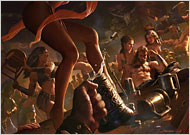 Sorry, but this is a post about Conan, and I’ll understand completely if you want to click right past it. It would be possible these days, when pop culture and pulp culture are respectable fields of academic study, to gussy up the attraction that Conan the Cimmerian had for me during several weeks in the early 1970s. But no. I’ll give it to you straight: Conan was simple and visceral and I was entering a world that was complex and, um, mental. I would only learn later just HOW mental, believe me. Simple and visceral: to face the enemy, destroy him and then on to wine, sex and song.
Sorry, but this is a post about Conan, and I’ll understand completely if you want to click right past it. It would be possible these days, when pop culture and pulp culture are respectable fields of academic study, to gussy up the attraction that Conan the Cimmerian had for me during several weeks in the early 1970s. But no. I’ll give it to you straight: Conan was simple and visceral and I was entering a world that was complex and, um, mental. I would only learn later just HOW mental, believe me. Simple and visceral: to face the enemy, destroy him and then on to wine, sex and song.
This was a boy’s fantasy, I suppose. No planning ahead, no negotiation, no “meaning.” Cunning was allowed, perhaps, but not reflection: Conan was Peter Pan with muscles and a serious libido, and reading Conan was a momentary escape from the fate of adulthood. Robert E. Howard, his inventor, sketched a world with enough space for my imagination to start percolating, where I could dispatch my foes without a second thought. And then, pretty quickly, it came to an end, the stories exhausted, and I moved on and started slipping into an adult world that Conan would have put to the sword — and for good reason!
This came to me as I read Seth Schiesel’s story in the New York Times about a new Conan video game. Schiesel must have his own Conan intersection, because he knows the material. Early in the story he quotes from a key Conan text, “Queen of the Black Coast,” considered by Conan connoisseurs to be absolutely prime Conan.
Let me live deep while I live. Let me know the rich juices of red meat and stinging wine on my palate, the hot embrace of white arms, the mad exultation of battle when the blue blades flame and crimson, and I am content. Let teachers and priests and philosophers brood over questions of reality and illusion. I know this: if life is illusion, then I am no less an illusion, and being thus, the illusion is real to me. I live, I burn with life, I love, I slay, and am content.
Except that Howard was never content himself.
Continue reading Conan, and we don’t mean O’Brien